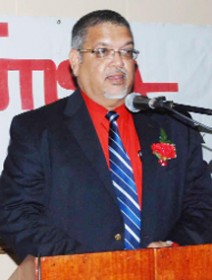Says 95 per cent of all detected frauds in Guyana go unpunished
The creation of an environment that encourages the free functioning of an unhindered, un-intimidated, freely functioning audit department that is accepted by both board and management is critical to the creation of an environment which is conducive to the prevention and detection of fraud, President of the Guyana Manu-facturers & Services Association (GMSA) Ramesh Dookhoo told accounting and auditing professionals attending a Thurs-day, April 8, one-day seminar on Fraud Prevention, Detection and Investigation organized by the Institute of Internal Auditors.

Dookhoo’s remarks come against the backdrop of increasing concern over what is widely felt to be failure by the authorities to put effective mechanisms in place either to rein in the incidence of fraud in state entities or to effectively investigate instances of fraud and mete out appropriate punishment to the perpetrators.
In a presentation that raised searching questions about the effectiveness of the existing regime in Guyana, Dookhoo alluded to the need to develop fraud statistics like those produced in the United States, but said that such a development had to be preceded by the creation of a “better auditing environment locally,” including the creation of small audit departments in all public offices and greater recognition of the importance of the profession under the Companies Act of Guyana.
According to Dookhoo, in the face of the prevailing deficiencies in the local auditing environment “the external auditor merely goes to the extent where he needs to certify the accounts against material mis-statements,” a circumstance that may well be resulting in organizations “losing millions of dollars in illegal activity that goes undetected.”
And the GMSA President told the seminar that “the slow pace of the judicial system” and “the lack of any forensic accounting services in the country” has led to a situation in which 95 per cent of all detected frauds in Guyana go unpunished. “The most important aspect of the non-prosecution of fraud is the loss of face by the institutions and companies, the unpreparedness of institutions to deal with and disclose fraud and the lack of recognition and responsibility on the part of the audit committee.”
According to Dookhoo, the creation of a better environment for the prevention and detection of fraud “lies in openness, in acceptance that you have a problem in developing anti-fraud policy… and in criminal prosecution and subsequent strengthening of systems designed to create more accountable organizations from the bottom up.”
Additionally, Dookhoo advocated more education in the field of auditing, the creation of “a cadre of fearless auditors” who are prepared “to go after the perpetrators of criminal activity,” a police force that is “trained in the guidelines of forensic evidence” and prosecutors “trained in the art of fraud detection and protection.”

